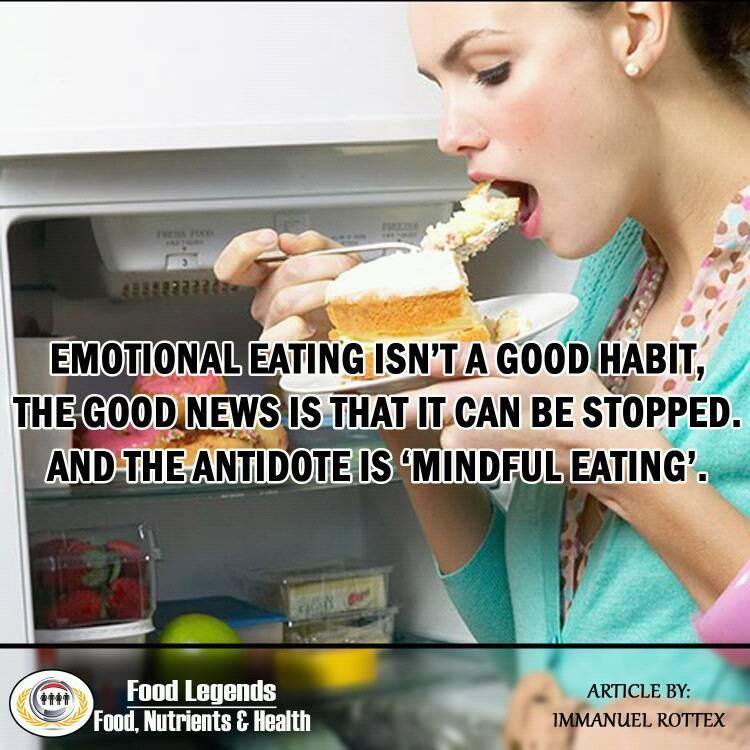*Emotional Eating Vs. Mindful Eating*
Emotional eating or stress eating is using food to make
yourself feel better—eating to fill emotional
needs, rather than to fill your stomach.
Using food from time to time as a pick me up,
a reward, or to celebrate isn’t necessarily a
bad thing. But when eating is your primary
emotional coping mechanism—when your first
impulse is to open the refrigerator whenever
you’re stressed, upset, angry, lonely,
exhausted, or bored—you get stuck in an
unhealthy cycle where the real feeling or
problem is never addressed.
Emotional eating isn't a very good habit. It can lead to binge eating, which is dangerous for the health.
To stop emotional eating what you need is *'Mindful Eating'*.
Mindful eating is a practice that develops your
awareness of eating habits and allows you to
pause between your triggers and your actions.
Most emotional eaters feel powerless over
their food cravings. When the urge to eat hits,
you feel an almost unbearable tension that
demands to be fed, right now. Because you’ve
tried to resist in the past and failed, you
believe that your willpower just isn’t up to
snuff. But the truth is that you have more
power over your cravings than you think.
Emotional eating tends to be automatic and
virtually mindless. Before you even realize
what you’re doing, you’ve reached for a tub of
ice cream and polished off half of it. But if
you can take a moment to pause and reflect
when you’re hit with a craving, you give
yourself the opportunity to make a different
decision.
While it may seem that the core problem is
that you’re powerless over food, emotional
eating actually stems from feeling powerless
over your emotions. You don’t feel capable of
dealing with your feelings head on, so you
avoid them with food.
Get mindful! - That's the simple secret.
Thanks for reading my last article for the week.
Article by: Immanuel Rottex
Good evening,
Enjoy your weekend.
Food, Nutrients & Health.
Emotional eating or stress eating is using food to make
yourself feel better—eating to fill emotional
needs, rather than to fill your stomach.
Using food from time to time as a pick me up,
a reward, or to celebrate isn’t necessarily a
bad thing. But when eating is your primary
emotional coping mechanism—when your first
impulse is to open the refrigerator whenever
you’re stressed, upset, angry, lonely,
exhausted, or bored—you get stuck in an
unhealthy cycle where the real feeling or
problem is never addressed.
Emotional eating isn't a very good habit. It can lead to binge eating, which is dangerous for the health.
To stop emotional eating what you need is *'Mindful Eating'*.
Mindful eating is a practice that develops your
awareness of eating habits and allows you to
pause between your triggers and your actions.
Most emotional eaters feel powerless over
their food cravings. When the urge to eat hits,
you feel an almost unbearable tension that
demands to be fed, right now. Because you’ve
tried to resist in the past and failed, you
believe that your willpower just isn’t up to
snuff. But the truth is that you have more
power over your cravings than you think.
Emotional eating tends to be automatic and
virtually mindless. Before you even realize
what you’re doing, you’ve reached for a tub of
ice cream and polished off half of it. But if
you can take a moment to pause and reflect
when you’re hit with a craving, you give
yourself the opportunity to make a different
decision.
While it may seem that the core problem is
that you’re powerless over food, emotional
eating actually stems from feeling powerless
over your emotions. You don’t feel capable of
dealing with your feelings head on, so you
avoid them with food.
Get mindful! - That's the simple secret.
Thanks for reading my last article for the week.
Article by: Immanuel Rottex
Good evening,
Enjoy your weekend.
Food, Nutrients & Health.











No comments:
Post a Comment
Please share your view below